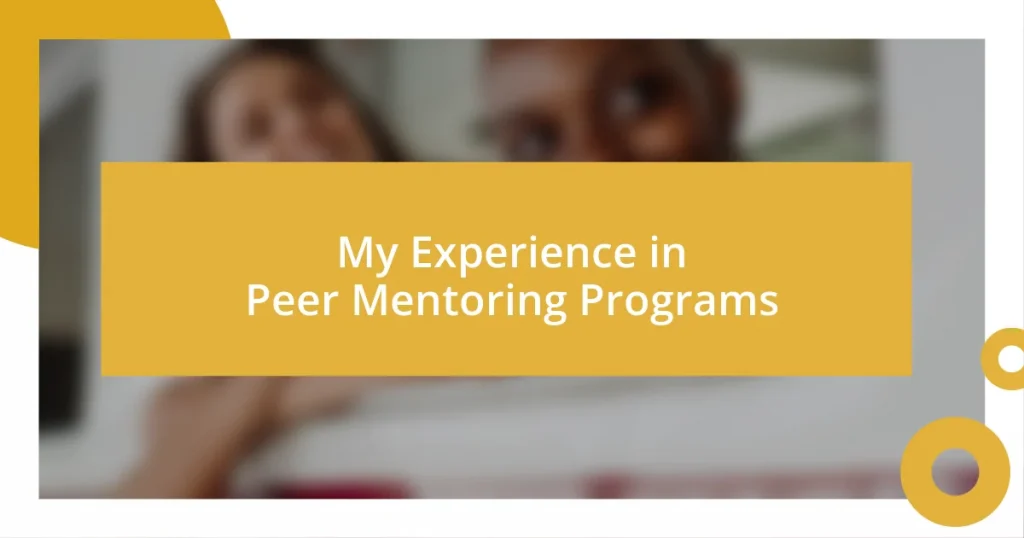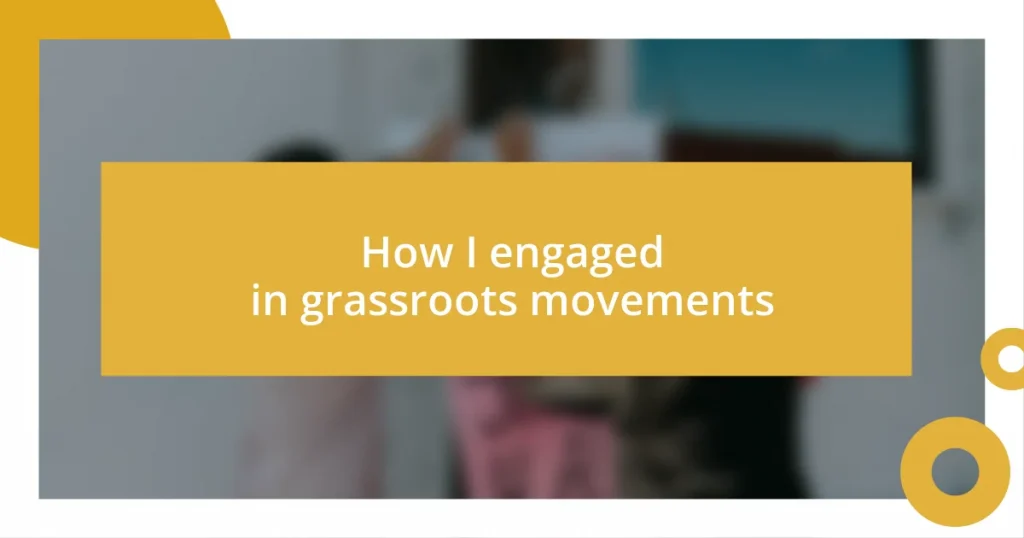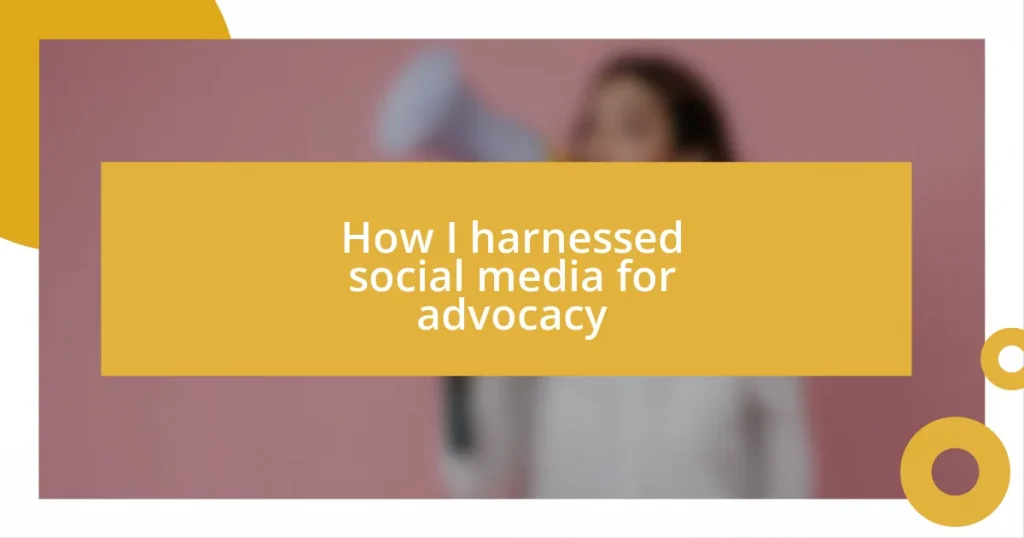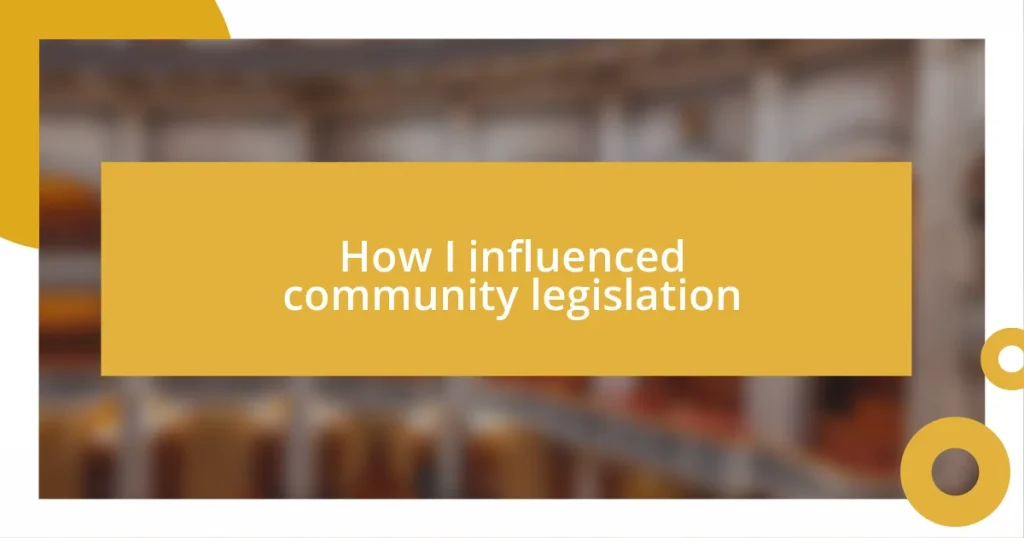Key takeaways:
- Peer mentoring fosters emotional support and community, allowing individuals to share their struggles and build trust through shared experiences.
- Effective mentoring relies on key skills such as active listening, empathy, and adaptability, which create a safe and engaging environment for mentees.
- Success stories illustrate the transformative impact of mentoring, highlighting personal growth and accomplishments that validate the efforts of both mentors and mentees.
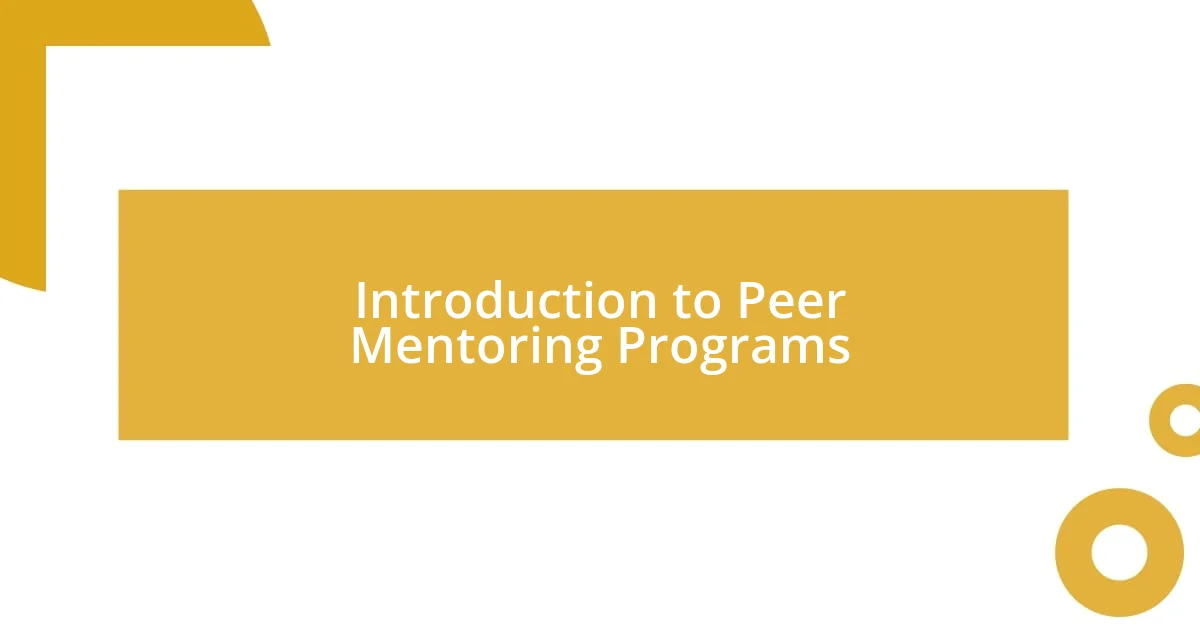
Introduction to Peer Mentoring Programs
Peer mentoring programs offer an invaluable opportunity for individuals to share experiences, knowledge, and support. I remember when I first joined a peer mentoring program; it felt like stepping into a community where everyone was genuinely invested in each other’s growth. Have you ever sought guidance from someone who’s walked a similar path? That connection is at the heart of what peer mentoring is all about.
These programs typically pair participants with mentors who have faced similar challenges and can provide guidance based on their own experiences. I recall a time when my mentor helped me navigate a particularly tough decision. Her insights made the road ahead feel less daunting. Isn’t it amazing how relatable advice can shift our perspective and motivate us to take action?
At its core, peer mentoring is rooted in empathy and shared understanding. When you share your struggles and triumphs with someone who truly gets it, it transforms the learning experience. I often think about how powerful it is to have someone say, “I’ve been there too.” Have you experienced that sense of camaraderie? It’s a gift that fosters both personal growth and stronger relationships.
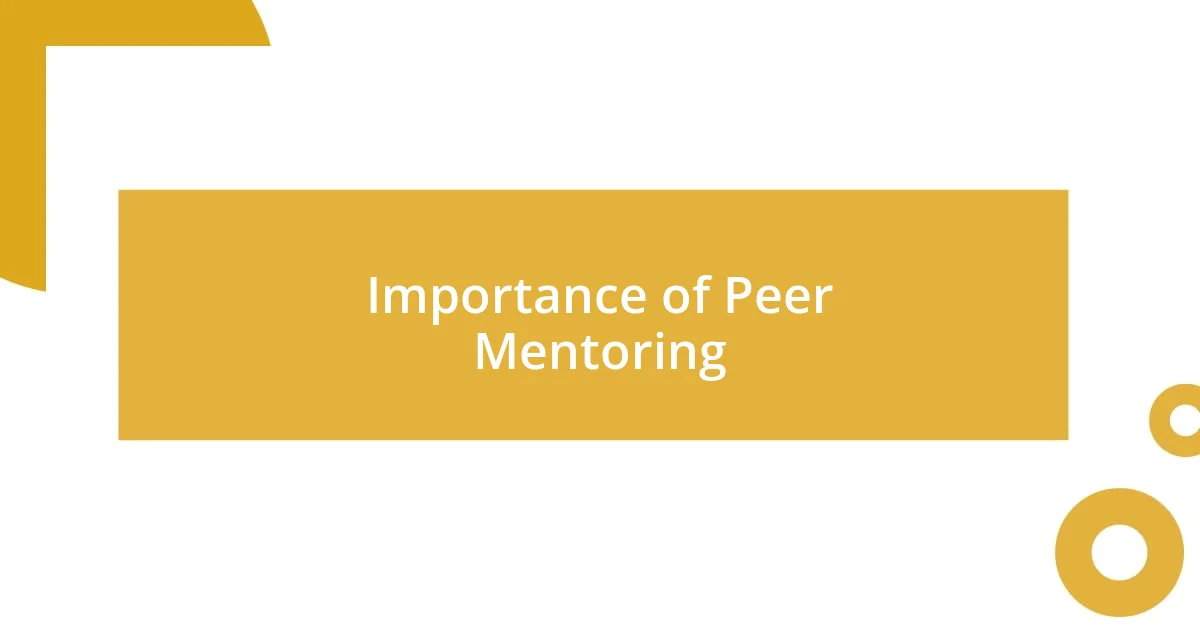
Importance of Peer Mentoring
Peer mentoring holds significant importance because it creates a support system grounded in shared experiences. I remember a time when I felt overwhelmed by my studies, and my peer mentor offered not just academic advice but also emotional support. It was reassuring to know someone had gone through the same struggles and emerged stronger.
Moreover, the impact of peer mentoring extends beyond individual development; it fosters a sense of community and belonging. In groups where everyone shares vulnerabilities, trust builds quickly. One specific moment stands out for me: during a peer mentoring session, we all shared our stories, and the room was filled with understanding and empathy. It’s remarkable how opening up can strengthen connections and lead to collaborative growth.
Lastly, the skills acquired through peer mentoring can significantly enhance professional development. I’ve seen this firsthand in my career—it cultivates communication, empathy, and problem-solving abilities. When we learn from peers, we not only gain knowledge but also build leadership qualities that prepare us for future challenges. Understanding different perspectives has been a game-changer for me; have you experienced similar growth in your own life?
| Importance of Peer Mentoring | Description |
|---|---|
| Emotional Support | Provides an understanding ear through shared experiences, enhancing personal resilience. |
| Community Building | Fosters a sense of belonging, making sharing struggles feel safe and collaborative. |
| Professional Development | Enhances skills such as communication and leadership through peer interaction. |
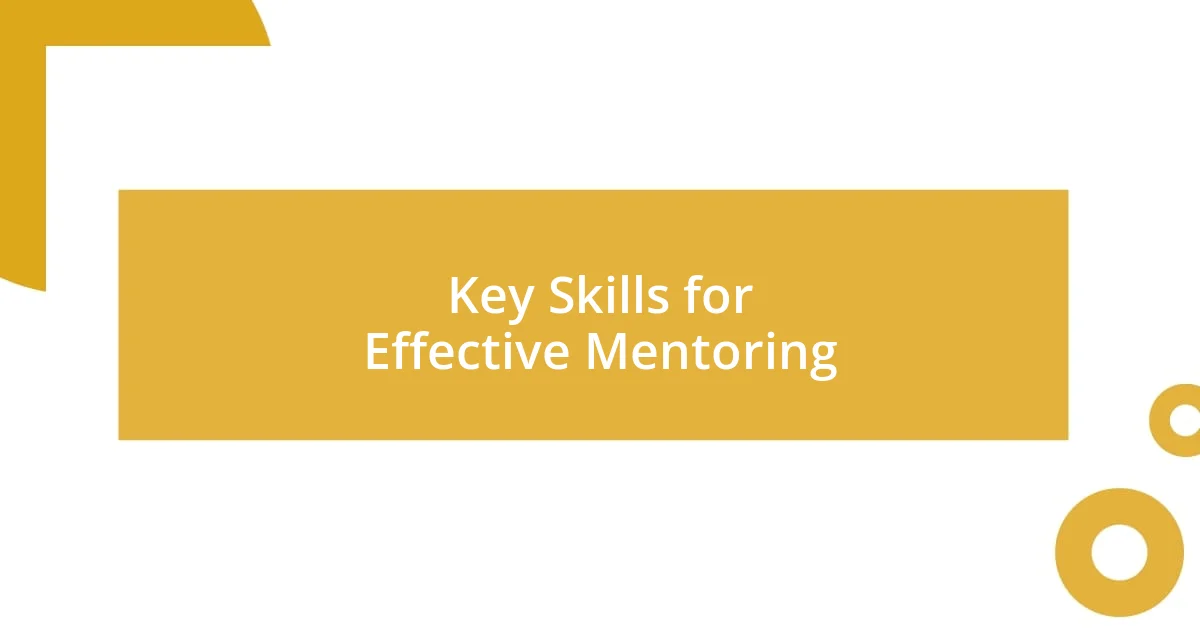
Key Skills for Effective Mentoring
Effective mentoring requires a unique blend of skills that foster growth and understanding. In my journey, I found that active listening was paramount. When my mentees felt heard, it opened up a dialogue that led to deeper discussions about their challenges. This mutual exchange not only built trust but also allowed them to articulate their thoughts clearly.
Here are some key skills that stand out in effective mentoring:
- Active Listening: Paying attention and showing genuine interest encourages open communication.
- Empathy: Understanding a mentee’s feelings helps create a safe space for sharing vulnerabilities.
- Adaptability: Being flexible to adjust your mentoring style based on the mentee’s needs can facilitate better engagement.
- Constructive Feedback: Offering feedback that is thoughtful and clear can guide mentees without discouraging them.
In addition, I believe that setting clear boundaries is crucial for a mentoring relationship. I once worked with a mentee who struggled with time management. By helping her establish limits on her commitments, we created achievable goals. This approach not only promoted accountability but also empowered her to recognize her own strengths and weaknesses. Seeing her progress brought me immense joy and reinforced my commitment to her development.
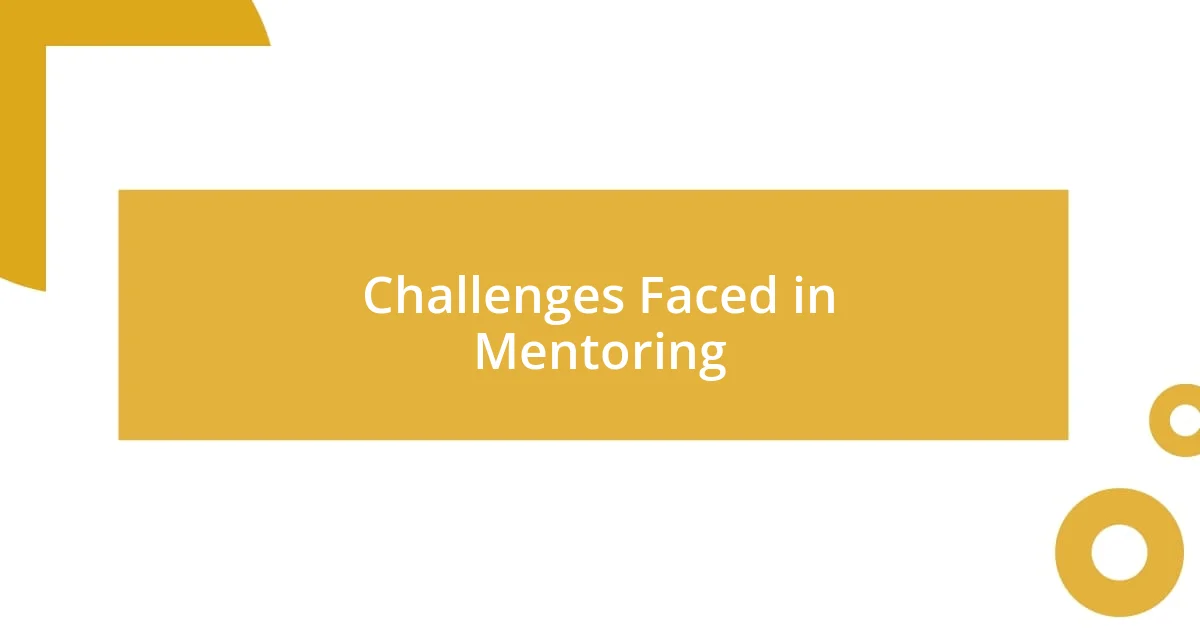
Challenges Faced in Mentoring
Mentoring isn’t always a smooth journey; there are challenges that can come up unexpectedly. For instance, I remember a time when my mentee struggled with openness. Initially, I felt frustrated. Why wouldn’t he share his thoughts? But then I realized that vulnerability takes time and trust. This experience taught me that patience is crucial in building rapport; it’s essential to create a safe space where mentees can express their concerns without fear of judgment.
Another significant hurdle in mentoring can be differing expectations. One of my mentees once came to me with a vision for her career that was vastly different from my own experiences. It challenged me to rethink how I guided her. Instead of imposing my views, I learned to ask questions that encouraged her to explore her goals further. Have you ever encountered this kind of disconnect in a mentoring relationship? I’ve found that open dialogue about each person’s expectations can lead to a more productive partnership.
Navigating time constraints is another persistent challenge I faced. Balancing schedules can sometimes feel like a juggling act. I recall a period where my responsibilities piled up, leading to longer gaps between our meetings. This distance created a sense of disconnection, which worried me. However, our eventual conversations led to a solution—establishing a regular check-in through messaging. It may seem simple, but this small adjustment made a huge difference in staying connected and ensuring consistent support. How have you managed time challenges in your mentoring experiences?
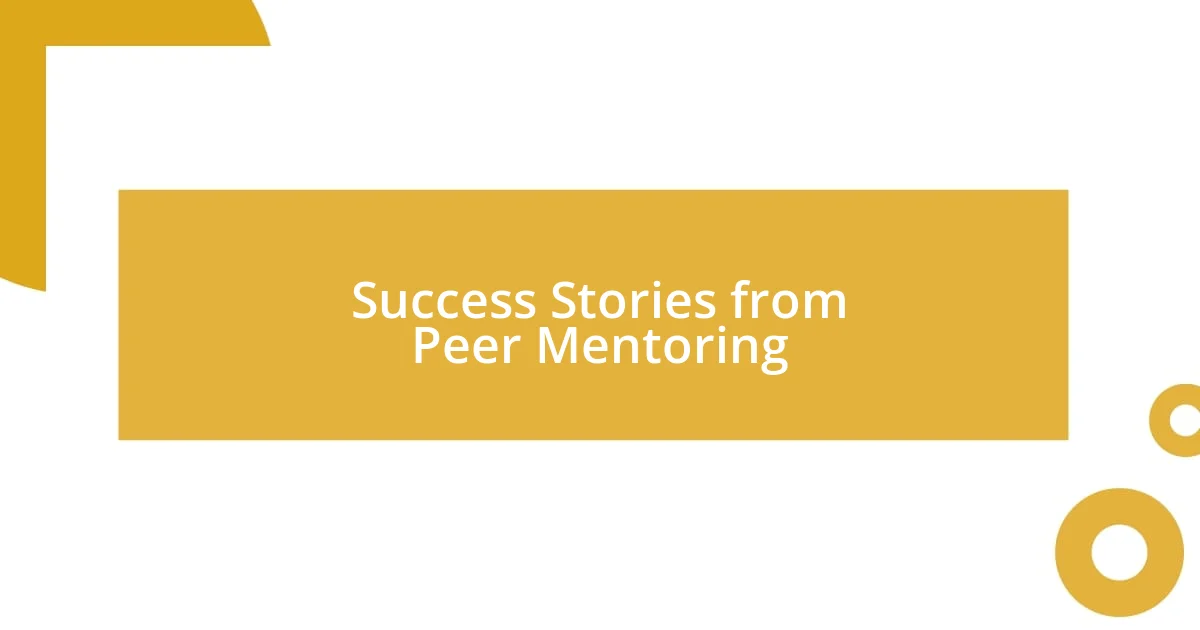
Success Stories from Peer Mentoring
Seeing the impact of peer mentoring firsthand has been incredibly rewarding. One mentee I worked with, who initially doubted her writing abilities, soared after we focused on enhancing her skills during our sessions. She recently submitted an article to a well-known magazine, and when I received her message about its acceptance, I felt a rush of pride. Moments like those affirm the transformative power of peer mentoring.
I also recall a time when I partnered with a mentee who lacked confidence in public speaking. Through a series of practice sessions with encouraging feedback, she not only conquered her fear but also delivered a presentation that wowed her peers. Did you know that sharing personal experiences can really open doors for others? I discovered that relating my own struggles with public speaking helped her feel more at ease, illustrating the importance of vulnerability in mentoring relationships.
One standout success story is when a mentee I helped secure an internship. I’ll never forget the day she shared her acceptance letter; it felt like I was receiving the news all over again! It was a beautiful reminder of how peer mentoring can unlock opportunities. Have you experienced a moment like this in your mentoring journey? Those wins, regardless of their size, validate all the hard work invested in the relationship and inspire both mentor and mentee to push further.
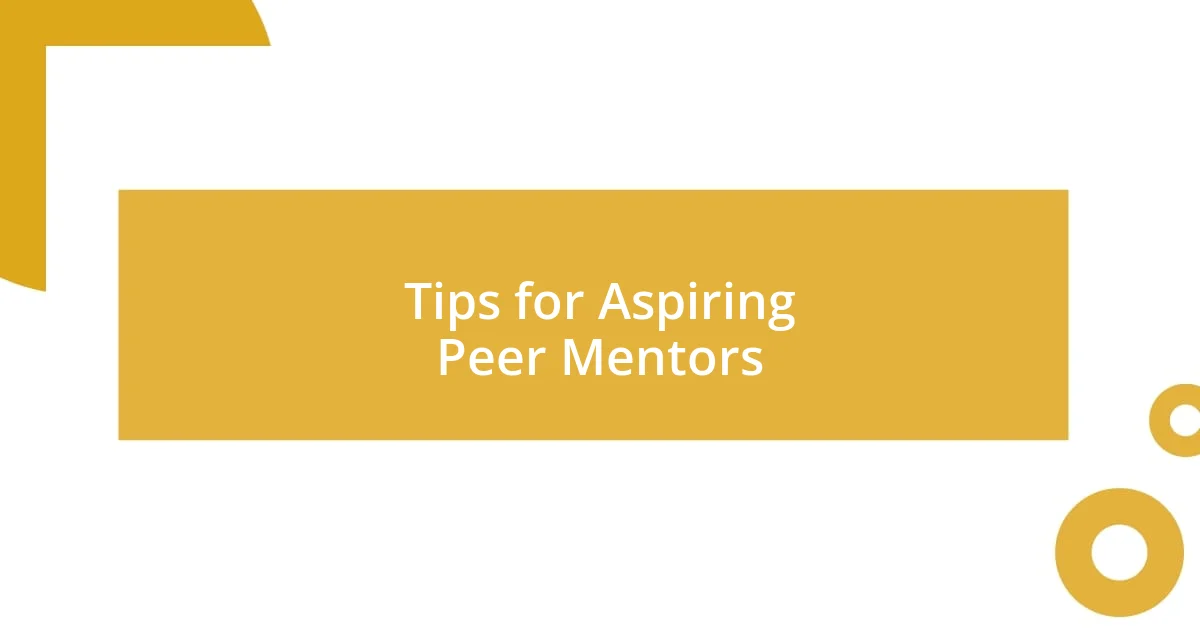
Tips for Aspiring Peer Mentors
When considering becoming a peer mentor, it’s essential to lean into active listening. I’ve learned that truly hearing my mentees not only makes them feel valued but also helps me understand their needs better. Sometimes, a simple nod or encouraging “tell me more” can reveal insights that open doors to deeper conversations. Have you ever noticed how powerful it feels when someone genuinely listens to you? It’s a game-changer.
Building trust from the onset is another vital tip. I remember starting with a new mentee who was understandably nervous. To ease her apprehension, I shared my own mentoring experiences, including my failures. This vulnerability not only made me relatable but also inspired her to open up about her challenges. By establishing this connection early on, it created a supportive environment where honesty flourished. It made me think, doesn’t everyone deserve that space to be themselves?
Finally, don’t underestimate the value of setting clear goals together. One glaring lesson I’ve taken from my mentoring experiences is the importance of alignment. Whether it’s academic achievements or personal growth, laying out specific, manageable goals gives direction to the relationship. I recall working with a mentee who had an overwhelming list of aspirations. We broke them down into actionable steps, which not only made them feel achievable but also instilled a sense of progress in her. Isn’t it fulfilling to see someone move forward, step by step?










